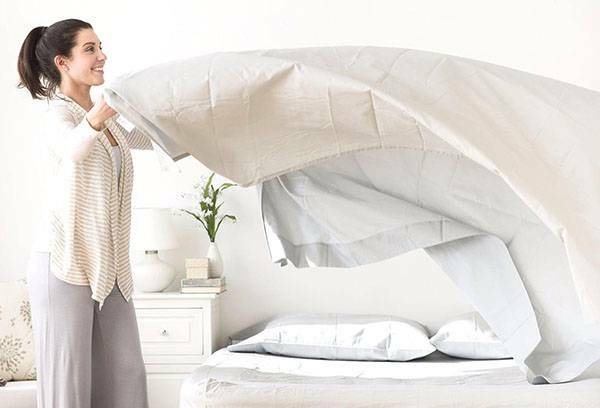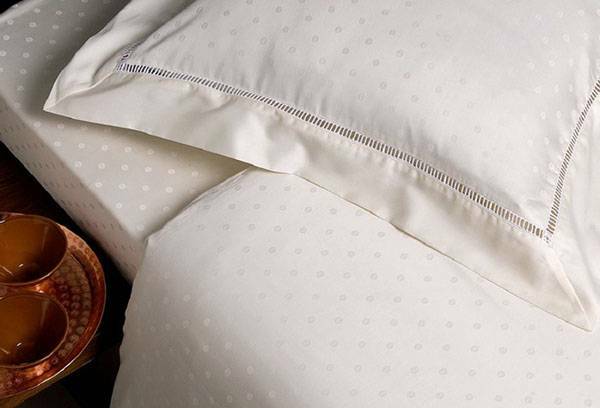For sure in the book on housekeeping there was a whole chapter devoted to how often to change bed linens at home: exceed the recommended time for at least a day - and you are no longer an exemplary keeper of the hearth. But how are things now? You will be surprised, but with a high degree of probability you wash sheets, duvet covers and pillowcases a sufficient number of times: be it once a week or a month.

How often is it to change clothes?
How is this even possible? Is there really no specific figure that you need to focus on? Why, then. Ask the scientists, and you will be told that the linen should be changed every 7, well, a maximum of 10 days. In this case, a more rare change of linen is wrapped in such a haze of frightening tales that, willy-nilly, you want to change the kit immediately.
So, what is the reason for such a frequent change of clothes?
- A person sleeps for about 8 hours a day. About the same amount he wears clothes at work or school. To wear the same jacket for 2 weeks in a row - beyond the bounds of public decency, which means that you need to change your underwear as often.
- Dead cells accumulate on the bed, which can attract bugs, the presence of which you will absolutely not be happy.
- Fat, which is secreted by the sebaceous glands, it becomes more difficult to wash over time: it is not even Whiteness that helps to remove the old yellow spots on the pillows.
- In a dream person sweats, giving a total of a liter of liquid per night. Who wants to sleep on a soaked bed sheet or pillowcase?
- Sweat, fat and dead cells cause an unpleasant odor that can prevent you from enjoying a healthy quality sleep. Still, it's easier to sleep in a fresh crib.
- Dirt that accumulates on sheets and duvet covers, promotes the reproduction of bacteria and fungi, which is not so easy to remove by washing.
- Dust and dirt on bed linens can exacerbate certain chronic respiratory diseases, for example asthma.
By the way
Than hot water when washing, the more germs and bacteria will die. So, in most machines the "cotton" mode at 90 ° C is designed specifically for washing clothes, and not so long sheets and pillowcases are generally boiled in large saucepans.
It sounds like it's time to throw all the cases and urgently to do the washing of the laundry, which you made an inadmissibly long 11 days ago. Then why - and here you probably know yourself - the minimum number of people is not lazy to change kits weekly, but the majority delays washing up to two weeks, and sometimes a month?

How often do I need to change my underwear?
Have you ever heard of a person falling ill with an incurable disease due to the fact that he did not wash clothes for too long? Hardly. Some individuals - which is too much, mostly bachelors - can use the same set for months and at the same time feel great! So how often do you need to change bed linens at home? Unfortunately, it will not work out a specific figure, because it depends on many factors.
- Some people have a tendency to sweating and sebum secretion stronger than others. In this case, the bed will get dirty much faster, and to refresh it( in order to prevent the appearance of yellow spots and unpleasant odor) will have to be much more frequent.
- But even if you sweat heavily and have oily skin, you can sleep in your pajamas or without it. In the first case, the nightie will take on some of the contamination, so the laundry will not so quickly get dirty, as in the second case.
- If you are insensitive to dust and its presence under the cabinets and on the shelves does not greatly poison your life, then dust on your underwear is unlikely to provoke an asthma attack.
- While the fear of fungi is really worth it, most bacteria on your sheets can not hurt you.
By the way
If you are considering whether to iron the laundry after washing or not, be guided by the degree of your fear of germs and the willingness to put up with folds and bruises of sheets and duvet covers.
- Microscopic pliers with a probability of 99.9% already live in your mattress, and this is normal. If the allergic reaction to the products of their vital activity has not manifested itself up to now in the form of a cold or itch, then, apparently, you are insensitive to them.
- The sweat that secretes the body accumulates not so much in the sheets as in the pillows and mattress, but about their regular cleaning is forgotten much more often than about changing the sheets. And in fact to clean cushions, blankets and a mattress recommend a minimum time in half a year!
- But the most important factor that will help you decide how often you need to change bed linens at home is your feelings. How much are you clean on a scale from hermophobia to a person who basically does not notice the garbage around? In the first case, you will not last five days on stale sheets, and in the second one, someone will be horrified at your ability to farm. In both extremes there is nothing good, but the golden mean here is difficult to measure up to the day. It could be a week, two, four, maybe even eight.

Advice
Although most of the bacteria that live on your bedding are harmless, when using the wash, it is not unreasonable to use bleach or other disinfectants.
We do not in any way encourage you to become sloppy: it's still difficult to find an excuse for the laundry that has not been washed for six months. But even within the limits of the norm each person has his own notions of cleanliness and dirt, and in most cases it affects the state of health that they like to appeal in various studies in an insignificant degree.
It's unlikely that anyone will dare to admit that he is washing clothes once a month or two: the fear of public censure is too great. But in fact, such a frequency of changing sets does not make you incorrigible slob and certainly does not jeopardize your health. As long as you feel comfortable sleeping on this sheet and you do not feel that the stale linen somehow affects your state of health, the only person whose opinion you should care about is your other half, whose concept of cleanliness and comfort candiffer from yours.
